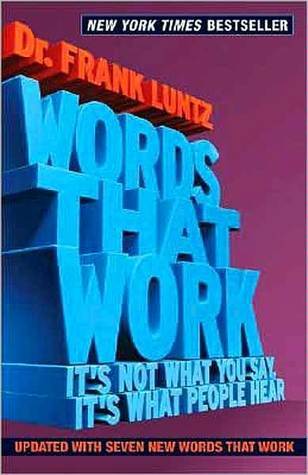More on this book
Community
Kindle Notes & Highlights
by
Frank Luntz
Read between
December 2 - December 8, 2021
I asked the brilliant Hollywood writer Aaron Sorkin, creator of The West Wing and Sports Night, and someone with a very different political orientation from mine, to explain the difference between language that convinces and language that manipulates. His answer stunned me: “There’s no difference. It’s only when manipulation is obvious, then it’s bad manipulation. What I do is every bit as manipulative as some magician doing a magic trick. If I can wave this red silk handkerchief enough in my right hand, I can do whatever I want with my left hand and you’re not going to see it. When you’re
...more
A statement, when put in the form of a rhetorical question, can have much greater impact than a plain assertion. If unemployment and inflation are up and confidence in the future is down, telling voters that life has gotten worse, while clearly factual, is less effective than asking voters “Are you better off today than you were four years ago?”
The reason for the effectiveness of questions in communication is quite obvious. When you assert, whether in politics, business, or day-to-day life, the reaction of the listener depends to some degree on his or her opinion of the speaker. But making the same statement in the form of a rhetorical question makes the reaction personal—and personalized communication is the best communication.
A visual context that supports and reinforces your language will provide a multiplier effect, making your message that much stronger.
It’s not just the substance of the message that’s significant, it’s also who delivers it. We see this everywhere. David Letterman or Robin Williams can take the most wispy, meaningless nothing of an idea and spin it into comedy gold. Your cousin Lenny tries out the same material, and he comes off about as funny as a stubbed toe.
The biggest difference between the genders is in response to tone. Women react much more negatively to negative messages than do men. They don’t like companies that trash the competition, and they don’t like candidates that twist the knife. Cola wars, beer wars, and burger wars are entertainment to men . . . and noise to women.
Americans will often come to diametrically opposite conclusions on policy questions, depending on how the questions are phrased—even if the actual result of the policies is exactly the same. In effect, positioning an idea doesn’t merely “frame” it so that it carries a certain meaning; it actually defines the terms of the debate itself. For example, by almost two-to-one, Americans say we are spending too much on “welfare” (42 percent) rather than too little (23 percent). Yet an overwhelming 68 percent of Americans think we are spending too little on “assistance to the poor,” versus a mere 7
...more
The term “welfare queens” was coined by Lee Atwater, a close advisor to both President Reagan and the first President Bush, and a mentor to Karl Rove. In Atwater’s hands, “welfare queens” became a means of graphically highlighting people who were taking advantage of the welfare system. By using such a blatantly provocative phrase, Atwater not only shed a negative light on abusers but on the system itself, linguistically paving the way for fundamental welfare reform.
Several years ago I asked Americans whether they would be willing to pay higher taxes for “further law enforcement,” and 51 percent agreed. But when I asked them if they would pay higher taxes “to halt the rising crime rate,” 68 percent answered in the affirmative. The difference? Law enforcement is the process, and therefore less popular, while reducing crime is the desirable result. The language lesson: Focus on results, not process.
“A man may take to drink because he feels himself to be a failure, and then fail all the more completely because he drinks. It is rather the same thing that is happening to the English language. It becomes ugly and inaccurate because our thoughts are foolish, but the slovenliness of our language makes it easier for us to have foolish thoughts.” —GEORGE ORWELL
ii. Never use a long word where a short one will do. iii. If it is possible to cut a word out, always cut it out. iv. Never use the passive where you can use the active. v. Never use a foreign phrase, a scientific word, or a jargon word if you can think of an everyday English equivalent.
Regardless of the facts, even if it’s unfair to do so, it’s only human nature for audiences to regard silence as a tacit admission of wrongdoing. Every attack that is not met with a clear and immediate response will be assumed to be true.
those who define the debate will determine the outcome, and the opponents of Social Security reform got the “privatization” label to stick, and therefore sunk Social Security.
From deciding which house to buy, to choosing the location of the family’s next vacation, to selecting the brand of beer in the fridge for her husband, women are making choices that affect far more people than just themselves. Women may still face a glass ceiling in the workplace, but they have more control over the family wallet than their male counterparts do.


